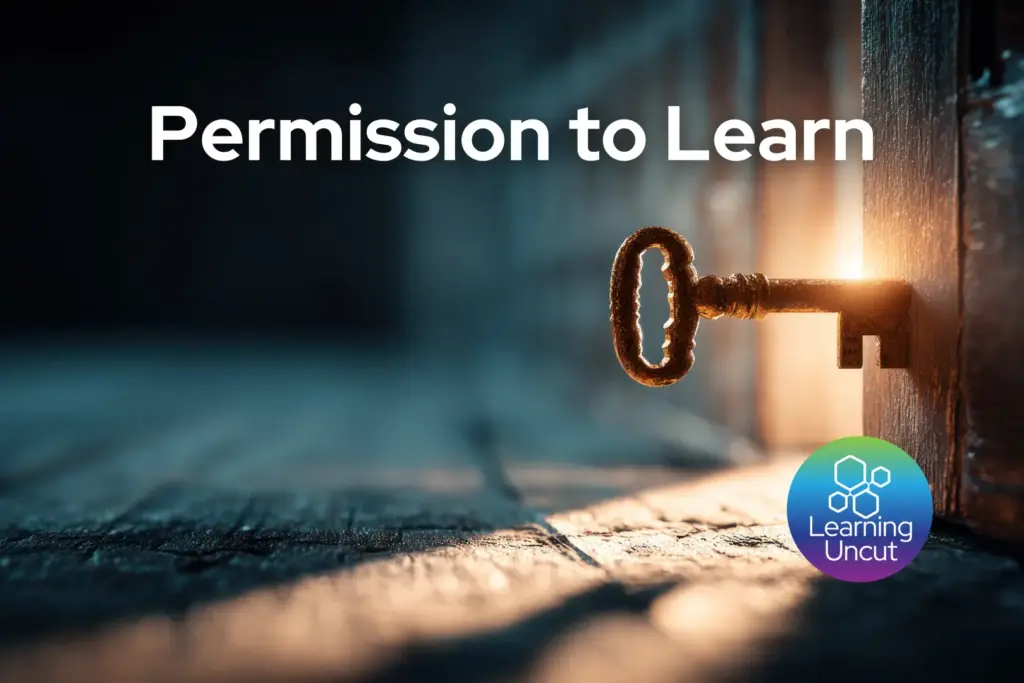Right now, more than ever, our organisations need Learning and Development to take bold action with courage, insight and clarity. They need us to break free of fixed thinking habits and experiment and take risks to make smart contributions.
In the recent Learning Uncut Emergent podcast season we explored the core strengths that Learning and Development (L&D) need to take bold action. I’m still making sense of the conversations from this season. I’ve continued thinking and talking about boldness, weaving it into my work in both conscious and subconscious ways. This has led me to a recent a-ha moment that I think is worth sharing – an insight that I’ve had about why it’s so important that we, as L&D professionals, take bold action right now. A reason that might help you muster the courage and confidence you need to take bold action.
Boldness is the willingness, confidence and courage to take risks – calculated risks, as our Emergent guest Damien Woods put it. Our season guests gave us lots of examples about what bold action looked like to them including experimenting with new technology in the face of resistance from others and rethinking their philosophy about the role of learning upon discovering that great training was having no impact on performance.
I’m preparing a keynote address on the topic of what organisations need from Higher Education. I’ve not spoken specifically about this sector before – or to an audience predominantly from the Higher Ed sector, although I have seen the deep pressure that the sector is under from working with the People & Culture team in an Australian higher ed organisation. When I started my research for this keynote I found a lot of articles about much-needed reforms in the sector, some going as far as suggesting that there was an existential crisis in higher education.
Is this sounding familiar to anyone in L&D? We’ve all seen whole L&D teams made redundant, cut out of organisations. A recent high-profile cut was the talent development team at TikTok. One article cited an internal memo in a way that suggested that the approaches of the talent development team had limited practical value and were disconnected from company needs. Regardless of whether this is true or not, there is clearly a perception that the team was not adding enough value to the organisation. I have faced this challenge myself as an L&D leader fighting for the survival of my team amidst cost-cutting and restructuring – and I know of industry colleagues who are in this situation right now.
So, why am I sharing examples of L&D teams struggling for survival – in much the way some higher education institutions are also facing serious threats to their ongoing survival?
Survival could be one motivation for taking bold action. Or even to gain respect and credibility – to get that often yearned for seat at the table. Yet, these motivations are tinged with a sense of entitlement, a sense that L&D deserves respect and credibility. Survival, respect and credibility are inward-looking motivations. Instead of seeing them as something that we strive towards for their own sake, what if we view respect and credibility as a by-product of working towards a higher purpose?
As I looked through the draft of my keynote on what organisations need from Higher Education, it struck me that I could just as easily be having this conversation with a group of L&D professionals about what organisations need from L&D.
The pandemic has accelerated a range of long-term shifts that have dramatically reshaped the business landscape. People have had time to reflect on things that have been on the minds of many for some time. They’ve had time to re-evaluate what’s important. This has consolidated the rise in expectations on organisations to act with social responsibility and contribute to mutual prosperity. The relationship and power balance is shifting between people and organisations. Keen to protect their wellbeing and gain a greater sense of fulfilment, workers are quitting their jobs at unprecedented rates in what has been dubbed The Great Resignation.
Amidst ongoing disruption that demands adaptability, organisations are faced with a massive talent shortage. They cannot fill their skills needs from the labour market. The gap will continue to widen as digital innovation accelerates. Reskilling the existing workforce is essential. It must be done at pace to meet current gaps and on a sustained basis as new skills requirements emerge. However, to ensure that there are enough people available to reskill requires stemming the exodus. The Great Resignation must be met with the Great Reengagement. Lip service is not enough. People are looking for a genuine sense of connection to a purpose that aligns with their values, and to each other. Retention is not a numbers game. It’s a human game. It’s imperative to provide people with a sense of belonging, connection, inclusivity and let them know that they are valued.
Perhaps the game is changing even further and we are moving into what Donald H Taylor described in Learning Uncut episode 92 as an ‘unbound’ world. There is a wide range of ways of accessing talent across porous boundaries. This includes contractors, freelancers and contingent workforce providing a more fluid talent pool. This is not a way to get around the Great Reengagement. No matter what the employment relationship, people have similar expectations of their experience, connection and fulfilment.
Organisations need to reimagine work, restore trust and genuinely reengage people. L&D has a contribution to make. They can be part of creating more connected workplaces where people can thrive, allowing organisations to adapt in the face of disruption, shocks and crises.
Right now, more than ever, our organisations need L&D to take bold action with courage, insight and clarity. The need us to break free of fixed thinking habits and experiment and take risks to make smart contributions.
Let this be your higher purpose, your primary motivation for taking bold action.
Are you in?
If you are serious about taking BOLD ACTION in 2022 and looking for a support to gain deeper insight, develop influence to shape action and build the necessary courage and confidence I invite you to join the Emerging Stronger masterclass series – seven classes over six weeks that help you to develop new thinking habits and apply new lenses to your work to create impact. Bring your own business challenge to take bold action in your organisation immediately. For more information and to register go to emergentmasterclass.com.


